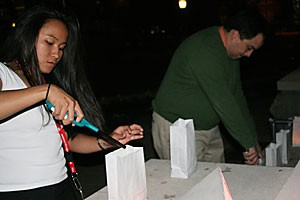The dim glow of 77 candles illuminated the UA fountain yesterday, remembering 77 people who have fallen victims of hate crime as part of its “”No Room for Hate on Campus”” program and candlelight vigil.
Melita Quance, anti-violence project coordinator for local lesbian, gay, bisexual and transgender community center Wingspan, said it is harder for her to hear about hate crimes than any other type of crime.
“”I just don’t understand why someone would kill another person out of hate,”” Quance said. “”Murdering someone because of their gender identity or sexual orientation or race or religion – these are things that are completely beyond someone’s control.””
Sharon Claros, hall director for Kaibab-Huachuca Residence Hall and an el Mundo committee member, began the evening with a quote from poet E. E. Cummings.
“”To be nobody but yourself in a world which is doing its best, night and day, to make you everybody else means to fight the hardest battle which any human being can fight, and never stop fighting,”” she read.
The event included a screening of “”Boys Don’t Cry,”” a film based on the true story of Brandon Teena, a transgender person who was raped and murdered in 1999.
“”People who identify as transgender live their lives every day just fighting for who they are inside,”” Claros said. “”It’s an everyday battle for them. The film shows what that battle is like – just to be who you are.””
The program coincided with the Transgender Day of Remembrance, which has been held since 1999, when it began in response to the still-unsolved San Francisco murder of a transgender person in 1998, said Michael Woodward, program coordinator for the Southern Arizona Gender Alliance.
Though the initial turnout for the movie seemed low, about 30 attended the event.
“”As long as we have one (person in attendance), that’s one who has changed their mindset,”” said Katherine Outlaw, hall director for Manzanita-Mohave Residence Hall, who gave everyone a white ribbon.
Each ribbon had a name on it that corresponded to one of the luminarias set up at the fountain on the west side of Old Main, Outlaw said. Attendees were invited to take the ribbons outside to read about the person whose name was printed on the ribbon.
Outlaw, who is also part of el Mundo, a program sponsored by Residence Life’s diversity initiatives, said there were about 77 luminarias that represented people who have been affected by hate violence or have been killed.
El Mundo is also known for coordinating the Tunnel of Oppression and the Hunger Banquet every year, she said.
The film was an emotional experience for Outlaw.
“”I cry every damn time I see it,”” she said. “”This is real for many people.””
Each year is themed, with last year’s theme being race, she said. The project screened the film “”The James Byrd Story,”” which told the tale of a black man who was murdered in 1998 by being dragged behind a pickup truck in Jasper, Texas.
The fact that this year’s theme was transgender awareness was coincidental, Outlaw said.
The event served to culminate a full week of transgender awareness events, cosponsored by the UA and SAGA, which is a part of Wingspan, Woodward said.
“”It’s the first time it’s been done in Tucson,”” he said, adding that weeklong events like this traditionally occur in big cities.
Tucson is one of the first smaller cities in the nation to hold this type of event, Woodward said. “”It’s definitely the first in Arizona.””
Phoenix, despite its size, has only a few small organizations and has never held a weeklong transgender awareness event, he said.
“”(SAGA is) unique in that we are for all genders,”” he said, whereas most groups elsewhere are for one gender identity or another.
UAPD received 11 reports of hate crime in 2005, according to its Web Site, though no arrests have been made within the past four years.
In a survey performed by the Tucson Commission on Gay, Lesbian, Bisexual and Transgender Issues in 2002, 56 percent of transgender respondents reported verbal harassments or threats. Eleven percent reported physical violence. Twenty-two reported having objects thrown at them.
Overall, about 47 percent of the more than 1,600 respondents reported verbal harassment or physical assault, despite having reported that Tucson is generally very welcoming.









